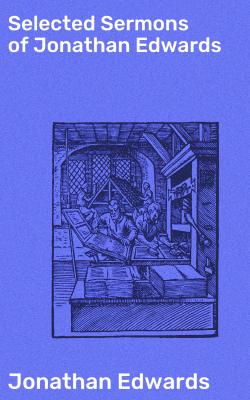Selected Sermons of Jonathan Edwards. Jonathan Edwards
Читать онлайн.| Название | Selected Sermons of Jonathan Edwards |
|---|---|
| Автор произведения | Jonathan Edwards |
| Жанр | Языкознание |
| Серия | |
| Издательство | Языкознание |
| Год выпуска | 0 |
| isbn | 4057664187062 |
Jonathan Edwards
Selected Sermons of Jonathan Edwards
Published by Good Press, 2019
EAN 4057664187062
Table of Contents
SELECTED SERMONS OF JONATHAN EDWARDS
SINNERS IN THE HANDS OF AN ANGRY GOD °
GOD’S AWFUL JUDGMENT IN THE BREAKING AND WITHERING OF THE STRONG RODS OF A COMMUNITY °
GOD GLORIFIED IN MAN’S DEPENDENCE
THE REALITY OF SPIRITUAL LIGHT
SINNERS IN THE HANDS OF AN ANGRY GOD
INTRODUCTION
Jonathan Edwards was born October 5, 1703, in what is now South Windsor, Conn., a part of the parish then known as “Windsor Farmes.” His father, the Rev. Timothy Edwards, the minister of the parish, a Harvard graduate, was reputed a man of superior ability and polished manners, a lover of learning as well as of religion; in addition to his pastoral duties, he fitted young men for college, and his liberal views of education appear in the fact that he made his daughters pursue the same studies these youths did. His mother, a daughter of the Rev. Solomon Stoddard, the minister of Northampton, is said to have resembled her distinguished father in strength of character and to have surpassed her husband in the native vigor of her mind. As regards remoter ancestry and their intellectual and moral qualities, Edwards seems also to have been well born; an exception, however, must be made of the eccentric and possibly insane grandmother on his father’s side, whose outrageous conduct led to her divorce.[1]
Brought up the only son in a family of ten daughters, apart from all distracting influences, in an atmosphere of religion and serious study in the home, amid natural surroundings of meadows, woods, and low-lying distant hills singularly conducive to a life of contemplation, the boy early developed that absorbing interest in the things of the spirit, and that astonishing acuteness of intellect which are the most prominent characteristics of his genius. While a mere child he spent much of his time in religious exercises and in conversation on religious matters with other boys, with some of whom he joined to build a booth in a retired spot in a swamp for secret prayer; he had besides several other such places for prayer in the woods to which he was wont to retire. His mind also dwelt much on the doctrines he was taught, especially on the doctrine of God’s sovereignty in election, against which he at that time violently rebelled. When only ten years of age he wrote a short, quaint, somewhat humorous little tract on the immortality of the soul; at about twelve he composed a remarkably accurate and ingenious paper on the habits of the “flying spider.”
He entered the Collegiate School of Connecticut at Saybrook—afterwards Yale College—at thirteen, and in 1720, shortly before his seventeenth birthday, graduated at New Haven with the valedictory. In his Sophomore year he made the acquaintance of Locke’s Essay on the Human Understanding—a work which left a permanent impress on his thinking. He read it, he says, with a far higher pleasure “than the most greedy miser finds when gathering up handfuls of silver and gold from some newly-discovered treasure.” Under its influence he began a series of Notes on the Mind, with a view to a comprehensive treatise on mental philosophy. He also began, possibly somewhat later, a series of Notes on Natural Science, with reference to a similar work on natural philosophy. It is in these early writings that we find the outlines of an idealistic theory which resembles, but was probably not at all derived from, that of Berkeley, and which seems to have remained a determining factor in his speculations to the last.[2]
After graduating he continued to reside for two years in New Haven, studying for the ministry. From August, 1722, till the following April he supplied the pulpit of a small Presbyterian congregation in New York, but declined the invitation to remain as their minister. After returning to his father’s home in Windsor, he received at least two other calls, one of which he seems to have accepted.[3] In September, 1723, he went to New Haven to receive his Master’s degree, was appointed a tutor at the college, entered upon the active duties of that office in June, 1724, and continued in the same till September, 1726, when he resigned his tutorship to become colleague-pastor with his grandfather Stoddard in the church at Northampton.
The spiritual history of Edwards in these years of growth from youth to early manhood is recorded by his own hand in a narrative of personal experiences written at a later date for his own use, in fragments of a diary, and in a series of resolutions which he drew up for the conduct of his own life. These documents, which were first published by his biographer and descendant, Sereno E. Dwight, in 1829, throw a flood of light on Edwards’s character and temperament, and serve to explain much in his life which would otherwise be obscure. He tells us in his narrative how the childish delight in the exercises of religion before referred to gradually
